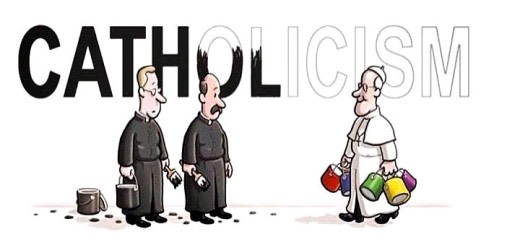Amoris Laetitia a door open to all, including the LGBT community
Aaron Bianco article* Published on the Catholic LGBTQ website Outreach (United States) on May 20, 2022, freely translated by Giacomo Tessaro, part before
In 2018 Aaron Bianco, professor of theology at the University of San Diego, was persecuted and forced to leave his position as a pastoral collaborator of the parish of San Giovanni Evangelista (San Diego, United States) after he had been discovered that he was gay.
As reported by San Diego Union Tribune, someone made an ethical in the parish and wrote homophobic insults on the wall; In addition, the tires of his car were tightened, and a ticket full of anger was left on the car. Subsequently, he was set on fire at the door of the church, Aaron received threats of death and was beaten by a parishioner after Mass. The FBI intervened, who asked him a question: is it worth dying for this job? Despite the support of Bishop Robert W. McElroy, Aaron resigned.
This month the situation overturned: Aaron was invited to speak to a prestigious academic conference on the apostolic letter Amoris Laetitia (the joy of love) organized in Rome by the Dicastery for the lay people, the family and the life and the pontifical Gregorian university. The theme of the intervention, published in full by outreach, is the Amoris Laetitia letter and LGBT people.
My name is Aaron White, I am gay and Catholic, and for seventeen I have a relationship. My experiences are an example of the pain, confusion and joy of many Catholic LGBT people. These experiences led me to love the Church deeply, but also to consider the magisterium in a realistic way, with its unrealistic vision of love and sexuality, which can disconcert and confuse Catholic LGBT people.
With Amoris laetitia We have the perfect opportunity to end up confusion and clarify LGBT relations, distinguish between sacramental marriage and civil unions, and find a way to bless the love present in such civil unions. As writing says, where there is love, there is God (1 John 4:16).
This can be the starting point for an authentic dialogue. The love commitment between two people of the same sex, as many moral theologians and also some bishops have reiterated, has its own value even if it does not completely correspond to the ideal of the Church. Cardinal Christoph Schönborn said: "Personally, I find that, in an era in which marriage is losing its nail polish, couples who live homosexuality want this form of commitment for themselves".
In Amoris laetitia Pope Francis opens the door to everyone, including the LGBT community. In the eighth chapter we read that it can no longer be supported simply that those who live in situations "Irregular" are in a state of moral sin, and are without sanctifying grace. This first step is wonderful, but in reality, LGBT people believe that God has created them as they are: in their heart and in their conscience they do not believe they are in a state of "irregularities". They strive to live their true identity in the body of Christ, and to do so they must feel welcomed by the whole Christian community.
I want to introduce you to four stories of Catholic LGBT people in the United States, with their joys and difficulties. I immediately clarify that these people have decided to stay in the church, but there are thousands of other people who have not felt welcomed, and have left the church forever.
They are true stories, of people I met working in the parish and university.
* Aaron Bianco teaches Theology at the University of San Diego and is the former coordinator of the LGBT ministries of the diocese of San Diego. This intervention, which you find Fullly here, was pronounced by Aaron at a conference on the Apostolic Letter Amoris laetitia (The joy of love) organized in Rome by the Dicastery for the lay people, family and life and by the pontifical Gregorian university.
Original text: The was Hounded from My Church Job Because I'm gay. This Month, I Spoke At A Vatican Conference on Love.






